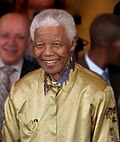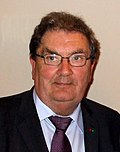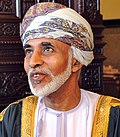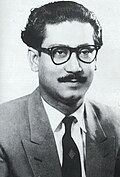Gandhi Peace Prize
Award From Wikipedia, the free encyclopedia
The International Gandhi Peace Prize, named after Mahatma Gandhi, is awarded annually by the Government of India.
| Gandhi Peace Prize | |
|---|---|
| Awarded for | Contributions towards social, economic and political transformation through non-violence and other Gandhian methods |
| Sponsored by | Government of India |
| Presented by | Government of India |
| Reward(s) | ₹ 1 Crore (10 million) |
| First award | 1995 |
| Final award | 2023 |
| Highlights | |
| Total awarded | 20 |
| Latest winner | Gita Press |
As a tribute to the ideals espoused by Gandhi, the Government of India launched the International Gandhi Peace Prize in 1995 on the occasion of the 125th birth anniversary of Mohandas Gandhi. This is an annual award given to individuals and institutions for their contributions towards social, economic and political transformation through non-violence and other Gandhian methods. The award carries ₹1 crore (equivalent to ₹1.2 crore or US$140,000 in 2023) in cash, convertible in any currency in the world, a plaque and a citation. It is open to all persons regardless of nationality, race, creed or gender.
A jury consisting of the Prime Minister of India, the Leader of the Opposition in the Lok Sabha, the Chief Justice of India, Speaker of the Lok Sabha and two other eminent person appointed every three years eligible for reappointment decides the awardee each year.
Ordinarily, only proposals coming from competent persons invited to nominate are considered. However, a proposal is not taken as invalid for consideration by the jury merely on the ground of not having emanated from competent persons. If it is considered that none of the proposals merit recognition, the jury is free to withhold the award for that year; the award was withheld in the years from 2006 to 2012 inclusive. Only achievements within 10 years immediately preceding the nomination are considered for the award; an older work may, however, be considered if its significance has not become apparent until recently. A written work, to be eligible for consideration, should have been published.[1]
Recipients
| Indicates a joint award for that year |
| Sl no | Year | Recipient | Image | Birth / death | Country | Description |
|---|---|---|---|---|---|---|
| 1 | 1995 | Julius Nyerere[2] |  |
1922–1999 | Julius Kambarage Nyerere was a Tanzanian politician who served as the leader of Tanzania, and previously Tanganyika, from 1960 until his retirement in 1985. | |
| 2 | 1996 | A. T. Ariyaratne[2] |  |
1931–2024 | Founder of Sarvodaya Shramadana Movement | |
| 3 | 1997 | Gerhard Fischer[3][4] | 1921–2006 | German diplomat, recognised for his work against leprosy and polio | ||
| 4 | 1998 | Ramakrishna Mission[2] |  |
(founded 1897) | Founded by Swami Vivekananda for promoting social welfare, tolerance, and non-violence among disadvantaged groups | |
| 5 | 1999 | Baba Amte[5][2] |  |
1914–2008 | Social worker, known particularly for his work for the rehabilitation and empowerment of poor people suffering from leprosy | |
| 6 | 2000 | Nelson Mandela[2] |  |
1918–2013 | Former President of South Africa[2] | |
| Grameen Bank |  |
(founded 1983) | Founded by Muhammad Yunus | |||
| 7 | 2001 | John Hume[1][2] |  |
1937–2020 | Northern Irish Politician and major figure in the Northern Ireland peace process | |
| 8 | 2002 | Bharatiya Vidya Bhavan[2] | (founded 1938) | Educational trust that emphasises Indian culture | ||
| 9 | 2003 | Václav Havel[6][7] |  |
1936–2011 | Last President of Czechoslovakia and first President of the Czech Republic | |
| 10 | 2004 | Coretta Scott King[2] |  |
1927–2006 | Activist and civil rights leader. | |
| 11 | 2005 | Desmond Tutu[8] |  |
1931–2021 | South African cleric and activist.He was South African social rights activist and retired Anglican bishop who rose to worldwide fame during the 1980s as an opponent of apartheid. | |
| 12 | 2013 | Chandi Prasad Bhatt[9][10] |  |
(born 1934) | Environmentalist, social activist and pioneer of the Chipko movement. Founded Dasholi Gram Swarajya Sangh (DGSS) | |
| 13 | 2014 | ISRO[11] |  |
(founded 1969) | Space agency of the Indian Govt. Objective is to advance space technology and deliver the applications of it | |
| 14 | 2015 | Vivekananda Kendra[12] | (founded 1972) | A Hindu spiritual organisation based on the principles preached by Swami Vivekananda | ||
| 15 | 2016 | Akshaya Patra Foundation | (founded 2000) | A non-profit organisation in India that runs school lunch programme across India | ||
| Sulabh International | (founded 1970) | A social service organization that works to promote human rights, environmental sanitation, non-conventional sources of energy, waste management and social reforms through education. | ||||
| 16 | 2017 | Ekal Abhiyan Trust | (founded 1986) | Contribution in providing Education for Rural and Tribal Children in remote areas pan India, Rural Empowerment, Gender and Social Equality. | ||
| 17 | 2018 | Yōhei Sasakawa |  |
(born 1939) | For his contribution in Leprosy Eradication in India and across the world.[13] | |
| 18 | 2019 | Qaboos bin Said Al Said |  |
1940–2020 | For contributions for social, economic and political transformation through non-violent and other Gandhian methods.[14] | |
| 19 | 2020 | Sheikh Mujibur Rahman |  |
1920–1975 | For his contributions towards social, economic and political transformation through non-violent and other Gandhian methods.[15] | |
| 20 | 2021 | Gita Press | (founded 1923) | For outstanding contributions towards social, economic and political transformation through non-violent and other Gandhian methods.[16] |
See also
References
Wikiwand - on
Seamless Wikipedia browsing. On steroids.